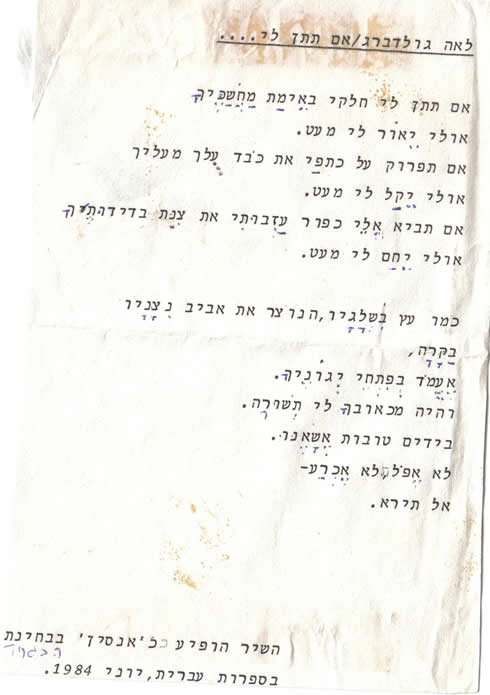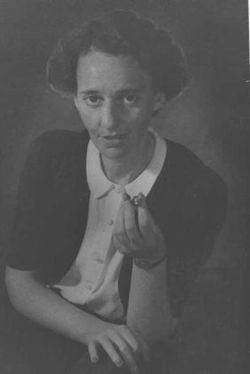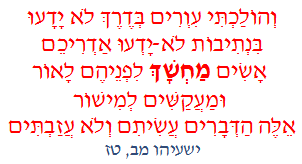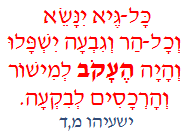|
InteGRATion into
GRATeFULLness
Singing&Sounding keeps me Sound
![]()
On this day one slices the bread
and
![]()
If you give me your part in the horror of your darknesses
|
2007_04_02 and three more songs by Lea Goldberg (2009) |
lyrics:
Lea Goldberg See the first song about grate-full-ness which I learnt from Lea Goldberg "Teach me, my God" and to which I added a stanza "Teach me to smile" |
tune: Moni Amarilio I didn't insert this bad recording here in order to enjoy it, but in order to learn the song by heart and sing it myself A youtube video does (not yet?) exist |
I heard this song for the very first
time,
|

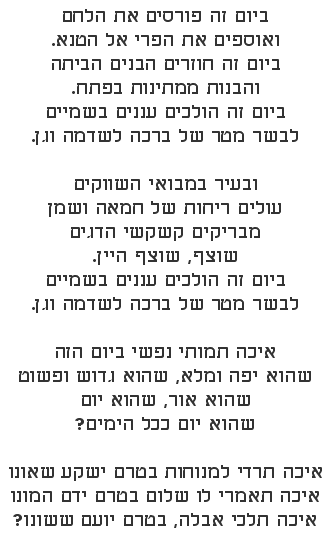
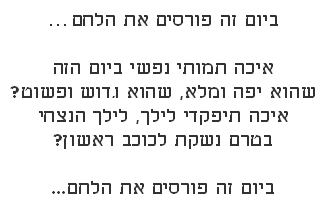
In 2007 I heart this song for the first and
last time ever - in a TV program about Moni Amarilio.
Luckily at that time I bothered with recording programs on my then still working
video-recorder.
But only in September 2009 I had the courage and patience to learn this beautiful
song by heart.
And only then I understood, that Lea Goldberg must have written it on a day
of deep depression,
the kind of which has been familiar to me most of my life and has not passed
entirely even today.
I connect this song to another song by Lea Goldberg, which also is immensely
important to me :
"Teach me to become grate-full"
I want to insert the magnificent photos from
a power point presentation,
called "Colors", which reached me towards Rosh Hashanah , the Jewish
New Year, in 2009 :
thus accompanying a song, which I learnt from a DVD for kids and sung by my
Mika (4 1/2) :
![]()
see
a song by Nomi Shemer, which starts with very same words
Open your eyes whoever does not look, |
lyrics:
my own
|
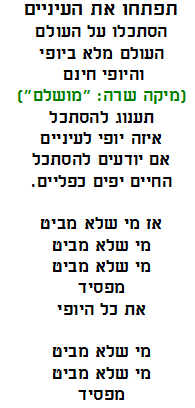 |
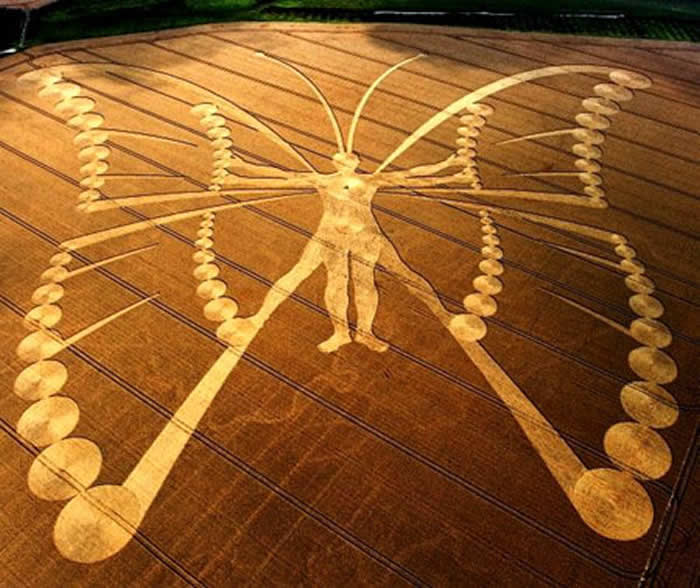
Largest Crop Circle ever reported: Netherlands August
2009
"Once the caterpillar,
with limited sight and a voracious appetite,
has fulfilled its cycle,
it gets all wrapped up in itself,
dissolving all bonds and attachments to what it used to be,
in order to embody its highest nature. "
"As we pass thru this time of transformation, we awaken to discover
our true Divine nature IS the Great-Full-Ness of Life.
We are designed to simply *en-joy* the experience of being Alive.
Beloveds~~~ give yourself a deep breath.
Breathe deeply again, this time into your heart,
and feel the Great-Full-Ness of Life.
"Now take a moment to look around,
and you will find reflections of Gratitude are everywhere
to be found.
Open your heart and allow the beauty of All that IS
to be a balm upon the soul,
and always remember that together we are better"
[from Stacey
Robyin, Go Gratitude, Sept. 2009]
"Our
World of Colors" (a powerpoint
presentation by Ruben V. Rosas)
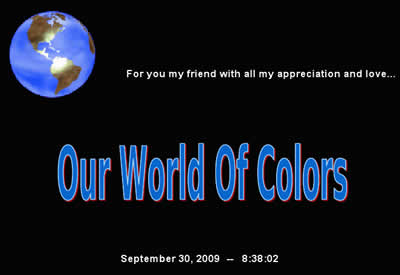

Continuation of "Our World of Colors " in the song "Where have all the flowers gone"
September 30, 2009; updated on October 22, 2009
Just recently I came across a poem by Lea Goldberg,
which had been the so-called "Unseen" test in Hebrew Literature,
in my youngest son Micha's "bagrut" examinations, Hod-Hasharon 1984
and which I have kept on a little worn-out piece of paper since that time.
A tune came to me now, and since October 22 I know the song by heart.
The more I sing it, the deeper I am touched,
and this despite the fact, that this is NOT my experience.
I
couldn't find a translation , but I discovered a good an article
which makes me feel even more, that Lea Goldberg and
I are sisters!
![]()
If you give me my part in the
horror of your darknesses
| Lea Goldberg and her poetry (by Tuvia Rivner) This is a poetry that recognizes limits—its own limits—to advantage. Lea Goldberg was born in 1911 in Koenigsberg, Germany (then Eastern Prussia, now Russia) and spent her early years in Kovna (now Kaunas), Lithuania, and in Saratov, Russia, during the first World War. At the end of the war she returned with her parents to Lithuania, completing high school at the Hebrew Gymnasium in 1928. She studied Semitic and Germanic languages, and history, at the Lithuanian University, and later at the universities of Berlin and Bonn, where she received her Ph D in 1933 on the subject of “The Samaritan [Bible] Translation: an examination of extant sources.” She immigrated to Mandatory Palestine in 1935, the year in which her first poetry collection, Smoke Rings, appeared. In addition to high school teaching,
Goldberg made a living in her new land at first by writing rhymed
advertisements, until she began to work as a newspaper editor
at Davar, and then on the staff of the newly established Al
Ha-Mishmar. She was a devoted children’s book
editor at the Sifriyat Po'alim publishing house, and wrote
theater criticism and literary columns as well. Among her books of
poetry Lea Goldberg’s lyric work, in which the western European literary tradition has a more considerable presence than in the poetry of her peers, carried her personal stamp from its earliest days: it is lucidly expressed, well-formed verse with clear rhythms and shapely meters. Her poetry doesn’t use historical or national themes, or, rather, it doesn’t get involved with them other than on the level of landscape: you will find instead in these poems a tree, a field, a thorn, the seasons. Goldberg's poetry perceives the general in the specific: a drop of dew reflecting vast distances—the concrete reflects the abstract. Her poetry is a system of echoes and mild reverberations, voices and whispers. This is a poetry that recognizes limits—its own limits—to advantage. It doesn’t seek to give more than it has. A generation that found itself called on to fight big wars, and social and national battles, here found relief in the hidden desire for a human scale, a private place that doesn’t object to the public world, but, rather, exists legitimately beside it. This poetry’s glance is directed mainly toward what is minor and modest. A majestic landscape like that of the Jerusalem hills consists here of a stone and a thorn; the eye perceives one yellow butterfly; against the vast sky there is only a single bird and even eternity is only "one eternity". The pairing of the singular with that which is not eye catching is a real source of strength --as the opposite or the negation of authority, indifference, and violence. Opposed to any sort of pathos, Lea Goldberg’s poetry easily connects to the generation that followed her. Her symbols, images, and phrases do not, in my opinion, offer any surprises to those who have become used to what is called modernist poetry. The element of surprise is missing in her work due to a mix of shyness and pride, love and suffering, which are not meant to surprise. The captivating quality of this poetry lies in its surrender. After all, every surprise contains an overpowering, violent aspect, to which her poetry by its nature objects. The language of Goldberg's poetry is not rich; its beauty lies in its conciseness, like the landscape in Goldberg's poem "My homeland, a poor land of beauty". One already feels in her early poems the trend which is fully realized in her later work: the stripping away of ornamentation. |
|
Two days later, September 15, 2009
(after my
return from Eilat and Elah)
I came across the biblical prophecy,
in which the strange word in Goldberg's poem "makhashakh"
- darkness - appears!
I felt, it should be preceded by a similar prophecy,
with the word "Ha-Aqov" - "that
which prevents us from going forward".
Two days later, September 17, 2009
I came across
the work for our (= I, David and Yaacov) project "Ma'avar Ya'aqov"
between "Aqaba" and Eilat in 1997:
"The word "Aqaba" ,
the root also of the name Ya'aqov in Hebrew and Ya'aqoub in Arabic,
means something, that blocks us from going forward.
At the end of the letter to King Hussein I quoted the Arabic proverb,
which we said to each other day and night, Aziz, Ahmed and I:
"The 'aqabaat are from the people,
but God's is the 'aaqiba - 'the result' of the things." "
|
And I will bring the blind by a way that they
knew not, |
|
October 26, 2009
It's only today,
that I understand, why I was led to rediscover that song,
and be so deeply moved by it,
though I believed, that the pain expressed in it, is not mine any longer,
and that anyway for an "exchange" like this there is no peer in
my life.
And yet another deeply moving song by Lea Goldberg I
learnt now,
when I re-read my
pages about AUschwitz-BirkenAU
in connection with the visit there by my grandchilden Rotem &Jonathan,
and listen to Hava
Alberstein's singing at Birkenau in November 2008
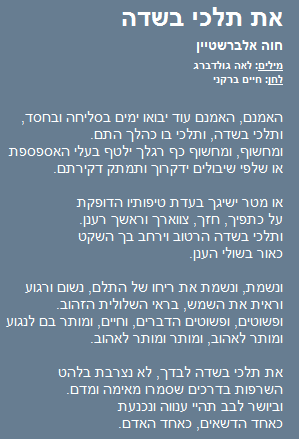
I inserted this song also in
another page with Lea Goldberg's songs
![]()
to former song to next song…..
to next song…..
